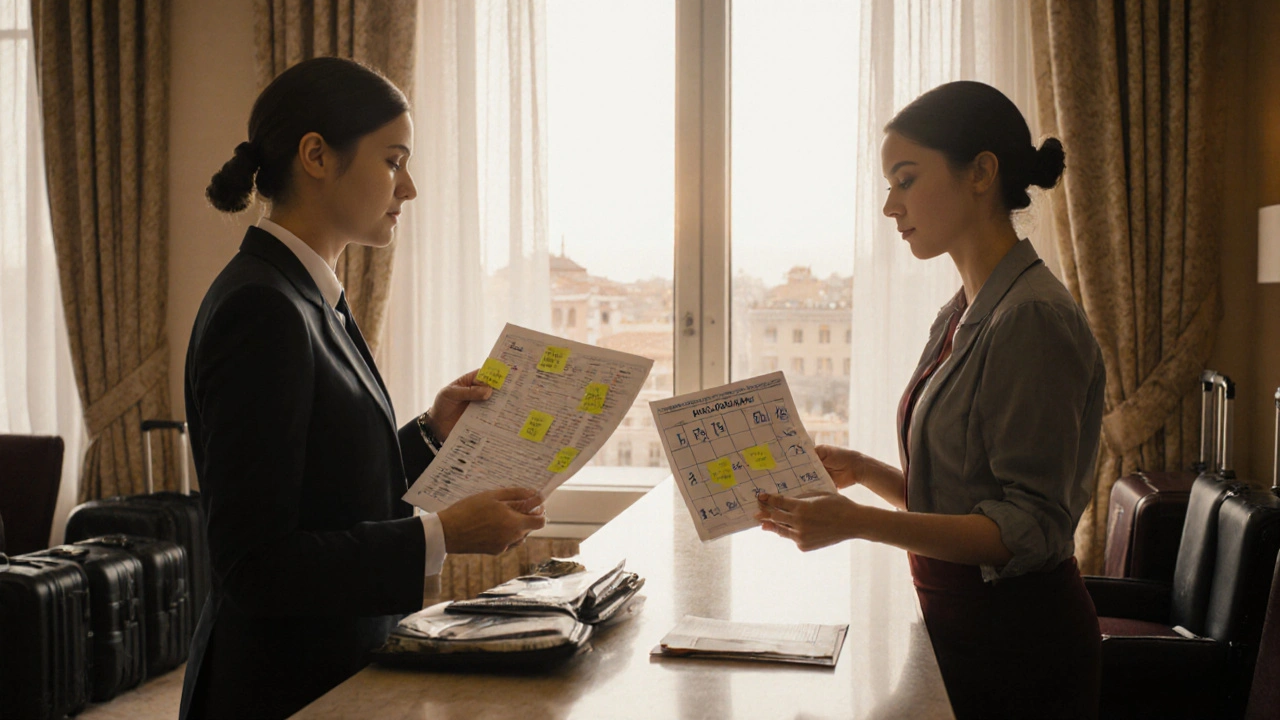Running a tour escort service isn’t just about guiding people around a city. It’s about keeping dozens of moving parts in sync-hotels that don’t overbook, coaches that arrive on time, drivers who know the routes, and staff who speak the local language. If one piece fails, the whole trip falls apart. That’s why successful tour escort services treat vendor management like a high-stakes puzzle, where every supplier matters.
Why Vendor Coordination Makes or Breaks a Tour
Imagine a group of 24 tourists from Canada arriving in Rome at 7 a.m. Their hotel check-in isn’t ready until noon. Their coach driver hasn’t been told the route changed because of roadwork. The guide doesn’t have the room list. By 9 a.m., tempers are rising. This isn’t rare-it’s the norm when vendors aren’t properly coordinated.
Top tour escort services don’t wait for problems to happen. They build systems that prevent them. That means knowing exactly who’s responsible for what, when, and how. It’s not about having the cheapest hotel or the loudest driver. It’s about reliability. A hotel that consistently holds rooms for late arrivals beats a five-star place that loses bookings. A driver who shows up 15 minutes early every day is worth more than one with a fancy car but a poor track record.
How Tour Escort Services Pick Hotel Partners
Not all hotels are created equal for group tours. A boutique hotel might be beautiful, but if it can’t handle 20 check-ins at 10 p.m. or doesn’t have a breakfast buffet that feeds 30 people on time, it’s a liability.
Successful operators look for three things:
- Group experience-Do they have a dedicated group check-in desk? Do they know how to handle early/late arrivals? Do they offer flexible meal times?
- Location-Is the hotel within walking distance of the tour’s starting point? Is it near public transport in case someone needs to slip away?
- Communication-Can they respond to a 6 a.m. email about a room change? Do they assign a single point of contact for the escort team?
In Istanbul, one tour company switched from a popular chain hotel to a smaller family-run property after realizing the chain had no system for group bookings. The family hotel? They kept a printed copy of every tour’s itinerary on the front desk. Every morning, they’d hand the escort a sticky note with room numbers and breakfast times. Simple. Reliable. No tech needed.
Coaches: More Than Just a Bus
Coaches aren’t just vehicles. They’re moving rooms, restrooms, and sometimes even kitchens. A bad coach experience can ruin a trip faster than a missed flight.
Tour escort services vet drivers and operators based on more than price:
- Driver reliability-Do they arrive on time? Do they know the route without GPS? Do they speak basic English or the group’s language?
- Vehicle condition-Is the air conditioning working? Are there working seatbelts for every passenger? Is there a working restroom on board for long transfers?
- Backup plans-What happens if the bus breaks down? Do they have a replacement ready within two hours?
In Greece, one escort service learned the hard way after a coach’s engine failed on a mountain road during peak heat. The driver didn’t have a radio. The company didn’t have a backup. Tourists waited six hours in 38°C heat. After that, they started requiring all drivers to carry satellite communicators and to be on call 24/7 during tours.

The Communication System That Keeps It All Together
Most tour failures happen because of broken communication-not broken equipment.
Top operators use a simple but strict system:
- Dedicated contact person-Each hotel and coach company has one named contact for the escort team. No calling random front desk staff.
- Pre-trip checklist-Three days before the tour, the escort team sends a confirmed list: arrival times, room counts, special requests, luggage rules.
- Real-time updates-A shared Google Sheet or simple app (like Trello or Notion) where drivers and hotel staff update status: “Coach arrived,” “Room 205 confirmed,” “Breakfast delayed 20 mins.”
- Evening huddle-Every night, the escort team meets with the hotel manager and coach supervisor to confirm tomorrow’s schedule. No email. No texts. Face-to-face or voice call.
This isn’t fancy. It’s basic. But 80% of tour companies skip the evening huddle. That’s why they’re always reacting-not planning.
Dealing With Last-Minute Changes
Flights get delayed. Roads get closed. Hotels get overbooked. It happens.
The difference between a smooth recovery and a disaster? Preparation.
Good tour operators keep:
- A list of 2-3 backup hotels within 10 km of every main stop
- A list of 2-3 vetted backup drivers with spare coaches
- A small emergency fund (usually $500-$1,000 per tour) to cover unexpected costs-like a last-minute hotel room, a taxi for a lost tourist, or a meal voucher when breakfast is canceled
In Barcelona, one escort service was told 12 rooms were canceled two hours before arrival. They called their backup hotel, which had 15 rooms ready. They paid $80 extra per room-less than the cost of angry tourists demanding refunds. The group never knew what happened.

Building Long-Term Relationships, Not Just Transactions
Vendor management isn’t a contract. It’s a partnership.
The best tour companies don’t treat hotels and coach operators as vendors. They treat them as part of the team. They send thank-you notes after big tours. They refer other operators to them. They give feedback-not just complaints.
One operator in Portugal started giving small bonuses to drivers who received positive feedback from guests. Not cash-gift cards to local restaurants. The drivers started showing up 20 minutes early. They started remembering names. Guests noticed. Reviews improved.
When you treat vendors like partners, they start acting like it. They call you before a problem happens. They find solutions. They go the extra mile.
What Happens When You Don’t Manage Vendors Well
Bad vendor management doesn’t just hurt your reputation. It hurts your bottom line.
One tour company in Thailand lost 40% of its repeat customers after three consecutive tours had major issues: missed hotel check-ins, broken AC on coaches, no guides at the airport. They blamed the weather. The drivers. The tourists. But the real problem? They never checked if their vendors were delivering.
They didn’t have a backup plan. They didn’t track performance. They didn’t talk to their partners. Within a year, they were out of business.
On the flip side, a small tour company in Kyoto now books out six months in advance-not because they’re the cheapest, but because their guests know they’ll never be left waiting.
The Bottom Line
Tour escort services don’t succeed because they have the best guides. They succeed because they have the most reliable partners.
Hotels and coaches aren’t just services you book. They’re the backbone of your customer experience. Treat them like it. Build systems. Communicate constantly. Reward reliability. Fix problems before they reach the guest.
When every vendor knows their role-and feels valued-your tours run smoothly. And that’s the only thing that matters in this business.
How do tour escort services choose which hotels to work with?
They look for hotels with proven group experience-dedicated check-in desks, flexible meal times, and reliable communication. Location matters too. A hotel that’s close to the tour start point saves time and stress. Most importantly, they pick places that respond quickly to changes and have a named contact person for the escort team.
What should tour operators look for in a coach provider?
Beyond the vehicle’s condition, they check driver reliability-do they show up on time? Do they know the route? Do they speak basic English? They also require backup plans: a spare coach ready within two hours, and drivers with satellite communicators for emergencies. Seatbelts, working restrooms, and air conditioning are non-negotiable.
How do tour escort services handle last-minute changes like flight delays?
They keep a shortlist of backup hotels and drivers at every stop. They also maintain a small emergency fund-usually $500 to $1,000 per tour-to cover unexpected costs like extra rooms, taxis, or meal vouchers. Quick decisions, clear communication, and pre-planned options turn disasters into minor hiccups.
Why is daily communication between the escort team and vendors so important?
Because most problems happen because of miscommunication, not failure. A daily evening huddle-face-to-face or by phone-with the hotel manager and coach supervisor ensures everyone knows tomorrow’s schedule. No emails. No texts. Just clear, direct talk. This prevents surprises and builds trust.
Can small tour companies compete with big operators in vendor management?
Yes-often better. Big companies rely on contracts and volume. Small operators build personal relationships. They remember names. They send thank-you notes. They pay drivers extra for good feedback. These small gestures make vendors more loyal and responsive. In tour operations, reliability beats scale every time.
